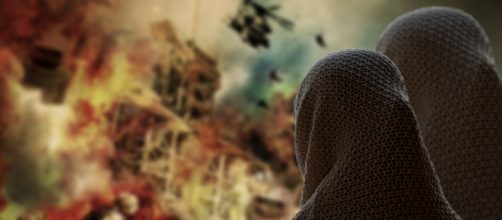Teresa May, Donald Trump, and Emmanuel Macron are to discuss taking military action against Syria. Following the suspected weekend chemical attack, the allies have vowed to intervene, even though no UN mandate for such action exists.
On Twitter, Donald Trump made it clear that the US wouldn't stand idly by and would, in due course, take action. Meanwhile, in Britain, the cabinet agreed in principle "on the need to take action" in Syria to "deter the further use of chemical weapons", a Downing Street statement stated.
In contrast, Russia has warned that such action may lead to a "dangerous" escalation.
Invited into Syria by the Assad-regime, Russia sees itself as a rightful protector of Syria's sovereign rights. In that content, Russia considers states and anti-Assad insurgents as acting in violation of Syria's sovereignty.
Reacting to the possibility of military action by the United States, Britain, and France, Vassily Nebenzia, Moscow's UN ambassador, said that the current situation was "very dangerous." According to a BBC report, he added, "the immediate priority is to avert war."
Following a private meeting of the UN Security Council in New York, Nebenzia also told reporters that, unfortunately, military action by the western allies could not be excluded as a possibility. Because of its presence on the ground, Russia vowed to protect its troops.
The head of the Russian military and senior Russian figures vowed to shoot down missiles at their launch site if Russian troops were under threat, so the BBC reports.
Russia accuses western allies of leaving chaos behind after military actions
During the recent UN Security Council meeting on Syria, Ambassador Nebenzia was highly critical of US-led military actions in different locations across the globe.
Harsh words were traded between him and the US Ambassador Nikki Haley. Russia blames insurgents for the chemical attacks, accusing western allies of using these atrocities as an excuse for Military Intervention. In response, Nikki Haley accused Russia of supporting Assad's chemical attacks, urging the UN to carry out a thorough investigation into the attacks, a call supported by representatives from France and the UK.
Relations between Russia and the western allies have been deteriorating in the wake of the Salisbury attack and appear on a continual downward spiral.
Western allies weigh up their options as chemical weapons watchdog is on its way to Syria
As the French, British, and US government continue their deliberations on a possible intervention, the OPCW (Organization for the Prohibition of Chemical Weapons) is making its way to Syria to investigate the recent attack.
According to Aljazeera, the organisation has deployed fact-finding teams. In a statement on Thursday, a watchdog representative said: "The Prohibition of Chemical Weapons (OPCW) confirms that the OPCW Fact-Finding Mission (FFM) team is on its way to Syria and will start its work as of Saturday 14 April 2018." According to SANA news agency, the Syrian ambassador to the US, Bashar Al-Jaafari, said that the Syrian government was prepared to give the investigating team access to all entry points in Douma.
Discussion on intervention continues
Teresa May, Donald Trump, and Emmanuel Macron have yet to decide what type of action they are planning to take. As for his part, the US president has promised to act without providing any specifics.
Never said when an attack on Syria would take place. Could be very soon or not so soon at all! In any event, the United States, under my Administration, has done a great job of ridding the region of ISIS. Where is our “Thank you America?”
— Donald J. Trump (@realDonaldTrump) April 12, 2018
In the UK, Teresa May may have won cabinet support for some form of intervention but opposition to military action has also been growing. According to the Guardian, both the Tory party and Labour are equally split on the issue.


